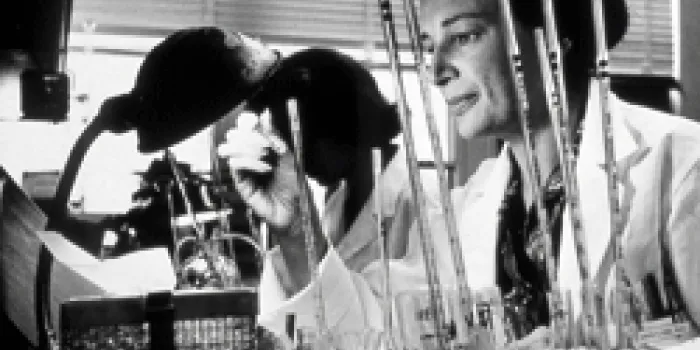The National Hemophilia Foundation (NHF) is pleased to announce the 2014 recipients of the Judith Graham Pool (JGP) Postdoctoral Research Fellowship: Elizabeth Chappell, PhD; Hongxia Fu, PhD; Jiyoon Noh, PhD; Sudharsan Parthasarathy, PhD; and Colin Kretz, PhD.
The JGP Postdoctoral Research Fellowship program supports basic science and preclinical research in bleeding disorders. The program is named for Judith Graham Pool, PhD, who in 1965 discovered cryoprecipitate, the first effective treatment for bleeding disorders. Since 1972, scientists have been funded for one- to two-year studies, which have produced insight into our understanding of hemophilia and other bleeding disorders. Funding for the program comes from contributions made by individuals, foundations, corporations, hemophilia organizations and chapters.
Chappell was awarded the NHF/Nicholas Cirelli Family Research Fund JGP Fellowship Award for “In vivo Imaging of Bleeds in Hemophilia B,” will develop a model for characterizing bleeding in hemophilia, particularly in joints. It will provide insights on the basic science underlying hemophilic bleeds, as well as optimal interventions and timing of treatment to potentially prevent damage caused by bleeds.
Chappell will pursue her research under the mentorship of Dougald Monroe, PhD, professor in the division of hematology/oncology, UNC School of Medicine and the UNC McAllister Heart Institute.
Fu received the NHF/Rueleen Kapsch JGP Fellowship Award for her research project, “Mechanoregulation of von Willebrand Factor Inhibition and Activation.” This work seeks to discover more about how the body responds to injury, and potentially pave the way for more directed diagnosis and therapeutics.
Fu has been a research fellow in the lab of Timothy Springer, MD, at Boston Children’s Hospital/Harvard University since 2011.
Noh’s study is “Induced Pluripotent Stem Cell-Derived Platelet Therapy for Hemophilia A.” The project will further determine whether a person’s own platelets that overexpress FVIII can be delivered directly to the site of injury and hemorrhage, thereby evading neutralization by inhibitors in hemophilia A.
Noh’s mentor is Mortimer Poncz, MD, at The Children’s Hospital of Philadelphia.
Parthasarathy was awarded the NHF/Bob and Margaret Carton JGP Fellowship for “Molecular Basis of Procofactor to Cofactor Activation in FVIII.” Results from this study will provide insights into the role of FVIIIa in regulating hemostasis and further explain the interactions between coagulation complexes.
Parthasarathy has been a postdoctoral researcher in the lab of Rodney Camire, MD, at The Children’s Hospital of Philadelphia since July 2011.
Kretz’s project, “A Comprehensive and Unbiased Screen of ADAMTS13 Substrate Specificity,” will use genome sequencing technology to evaluate the interaction between ADAMTS13,
von Willebrand factor and other potential factors. It aims to improve the understanding of ADAMTS13 biology and provide insights into the diagnosis and pathogenesis of other coagulation disorders, including von Willebrand disease.
Kretz has been a postdoctoral fellow in the lab of David Ginsberg, MD, since 2009.
NHF is grateful to the Nicholas Cirelli Family Research Fund, as well as Hemophilia of Georgia, Inc., for their support of the NHF/Bob and Margaret Carton JGP Fellowship and the NHF/Rueleen Kapsch JGP Fellowship Award.

